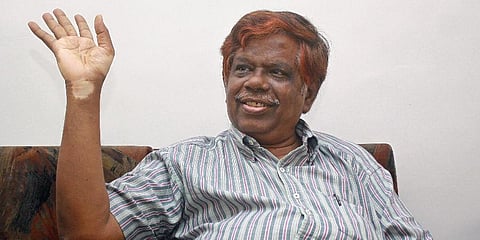

With critical acclaim pouring in for 'Jai Bhim', directed by TJ Gnanavel, CP Balasubramanyam caught up with retired Madras High Court judge, K Chandru, the inspiration for actor Suriya's role in the movie.
Excerpts from the interview.
What are you hearing about the movie?
The social media discussion is happening in different ranges; some are unhappy for various reasons, including the protagonist not being a Dalit or tribal and portraying the fight simplistically. These are imbecile arguments. What is important is that even before the release of the movie, the producers had donated Rs 1 crore to the Irular organisation. Second thing is that Chief Minister MK Stalin has responded to the movie. There is a visual and the reaction. He said the movie has disturbed him. Besides, it has evinced interest from youngsters. Many have said they do not know such things are happening. So, this movie has brought exclusiveness to inclusiveness. The first agenda for Irulars is they have made their presence felt. This will help restructure future policies or plans by including them.
Do you think 'Jai Bhim' is trying to address the credibility issue faced by the judiciary at the national level?
I saw posts on social media saying the movie is giving false hope for people on the judiciary. I do not think that way. If a man is thirsty, you give him a glass of water immediately. You do not tell him there is a project coming up to give you plenty of water. What is important is immediate attention to immediate problems.
A Left party is shown fighting alongside Sengeni in the movie. Does it mean other parties are not playing a role in the grassroots?
I don't think like that. It is not a party issue. Perhaps, the Left parties are more committed to the cause and therefore their visibility rate is more. Mainstream parties and their leaders have also worked for the cause. Unless there is a study, it is not possible to gauge this... I do not think there is conscious neglect.
Why is the conviction of police officials rare in harassment cases?
Section 4 of the SC/ST Act says if an official is part of the abetment of crime, he/she should also be prosecuted. In reality, it does not happen because it is they who file the chargesheets. However, the amendment to the law has brought a shift in the criminal justice system. Having said that, there is not even a normal IPC offense to prosecute police officers. Prosecution of police happens as an exception.
What do you suggest as a solution to curb police harassment towards SCs and STs?
There is something called Annual Confidential Report (ACR) for IAS and IPS officers. It assesses the character, conduct, and performance of the officers. Under question six, each officer is evaluated for his/her attitude towards SCs/STs. Once a report has adverse remarks, the officer may not get a promotion. So, there is a provision to watch them at the national level. But where is such a check for inspectors and constables? Also, in a class-ridden society, justice is also class-ridden. For instance, it is easier to commit a traffic offense in a four-wheeler than in a two-wheeler.
How to address the issue of magistrates in lower courts mechanically ordering judicial custody during the pre-trial process?
There are enough guidelines issued by the Supreme Court on this. But there is no awareness. Also, such things are done by magistrates who are inexperienced or have vested interests. In the Sathankulam incident, the magistrate remanded the two persons mechanically. I wrote to the Chief Justice but did not get any response.
The practice of profiling certain tribes as criminals has been still allegedly passed on to young police officers verbally during training. How to address the issue?
IPS officers in Hyderabad are sensitised about this during training. But what about head constables? He beats them and brings them to the police station. Any amount of orientation or sensitisation is not going to address the issue. But inclusiveness in the planning process will. Having shelter, education, employment, a say, and having participated in the civic process will.
Many lawyers hesitate to take up human rights issues as it is not a high-paying portfolio. What can address the issue?
A. There must be strong individual organisations committed to the cause at the district and State level who can support people in distress, particularly unorganised communities, by offering legal aid. Such organisations should be allowed to accept broad funding. The movie clearly registers the importance of such bodies and individual efforts and does not show the individual adventurism of a lawyer.